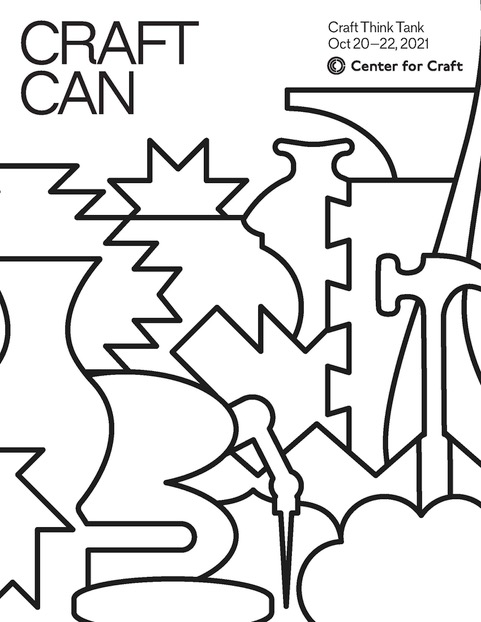Center for Craft in Asheville, NC fosters new ideas in the field of craft while backing the next generation of makers, curators, and scholars. In October of 2021, they brought together more than a dozen multidisciplinary thought leaders for “Craft Can,” a three-day virtual think tank and visioning process. Creation in Common helped Center for Craft plan the gathering and create a corresponding report that reflects the deep and nuanced work that took place during the think tank and serves as a foundation for the Center’s forthcoming strategic plan.
Carlo tapped Lindsey Burdick, our senior associate and project manager, to join him in working closely with the Center staff and advisory committee to determine a theme and direction for the convening and to draw up a list of attendees to invite. “Center for Craft has been hosting Craft Think Tanks since 2002,” explained Lindsey. “They wanted their 20th anniversary gathering to be substantial and seminal, a convening that would influence future work in the field.” The think tank is part of the Center for Craft’s ongoing exploration of craft’s relevance and impact.
Lindsey explained that the Center wanted to get their finger on the pulse of what matters right now in the world of craft. “They were asking: Who are we listening to? Whose voices are being amplified?” To find some answers, she conducted a series of interviews with people who represent perspectives that aren’t heard as often: makers of color, people who approach craft in novel ways, queer artists, up-and-comers, and people who have left the field. They helped shape the whole experience, from the direction of the conversation to the list of participants.
“They wanted their 20th anniversary gathering to be substantial and seminal, a convening that would influence future work in the field.”
The professionals and thought leaders in attendance at the think tank represented a wide range of fields, including science, humanities, health, design, and the arts. Lindsey explained that that was intentional. “There was a concerted effort to avoid an echo chamber process. When a lot minds from the same field come together — even if they’re brilliant — their perspective can be somewhat aligned.” That’s why, in addition to leaders in the craft field, the Center also invited innovators and experts in urban planning, robotics, climate change, disaster relief, and more. They brought unique perspectives to the ways in which craft can be defined, its place within current cultural and societal movements, and how it can have an impact on communities and society as a whole.
Lindsey also took the lead with planning and facilitating the meeting days and creating the corresponding report. The goal of the report was to provide a record of the conversations, but also to translate the ideas that were generated into a document that can be read and understood by the broader field and serve as a critical examination of the state of craft. Lindsey collaborated with the Center to distill the work down into seven major intersections that informed a final series of reflections about what craft can do.
Over the course of nearly six months, Lindsey and the team worked to refine the document through multiple drafts and iterations. Throughout the process, Lindsey stretched her knowledge base well beyond her field of study, which was science, to develop a deep appreciation for craft. “I honestly think this report may mean more to me than my master’s thesis,” she said. “It was a topic I knew very little about so I had no preconceptions. Working on this project, I tapped into a new part of my brain. I feel a lot of pride in what we accomplished — there’s a special my heart for this work.”
Learn more and read the 2021 Craft Think Tank report here.





 Follow @cmcuesta
Follow @cmcuesta
